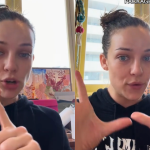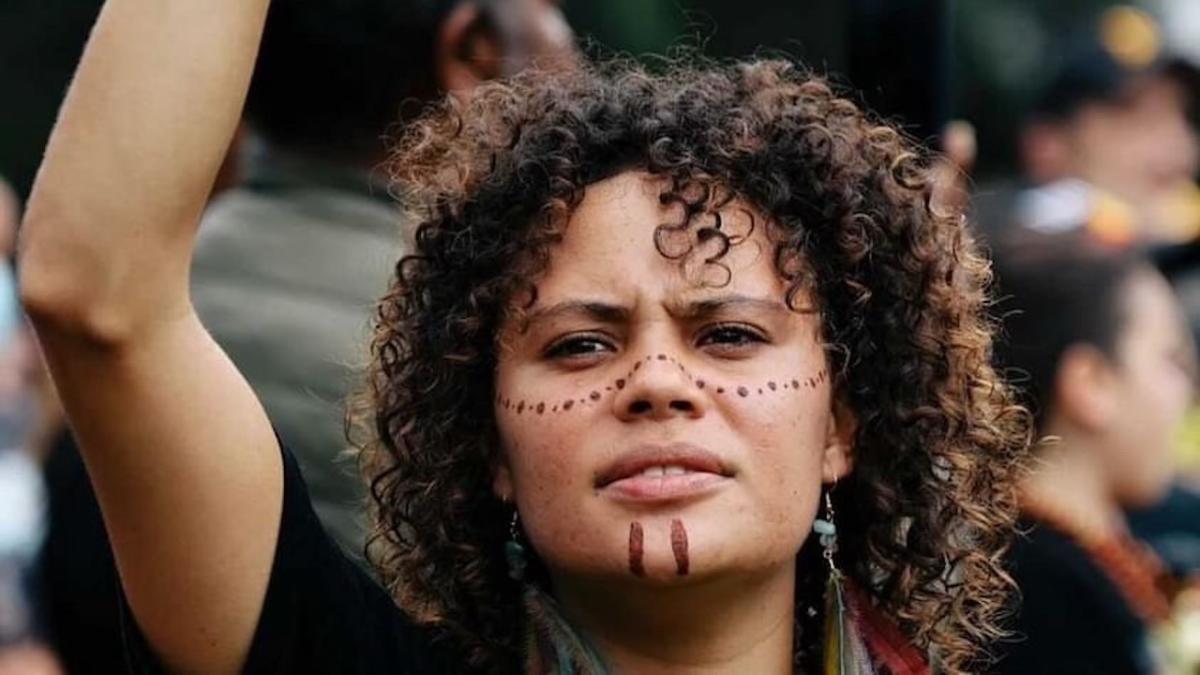
January 26th is a date that marks the start of Invasion in so-called Australia in 1788. It is a day where Aboriginal and Torres Strait Islander people are in mourning, coming together to spend time with Country, attending and organising Invasion Day rallies or marches, gathering together for dance, song or other ways of healing and reflecting on our survival together against genocide, invasion and colonialism.
In the lead up to Invasion Day, I reached out to this diverse group, who have generously shared parts of their story, providing a small window into their lives, the challenges they face daily, and their connection to Country, Culture and Community. I inviting them to have their voice heard loud and clear on what’s important to them and what’s been on their mind over the past few weeks shared with truth and pride.
*These interviews have been edited for length and clarity.
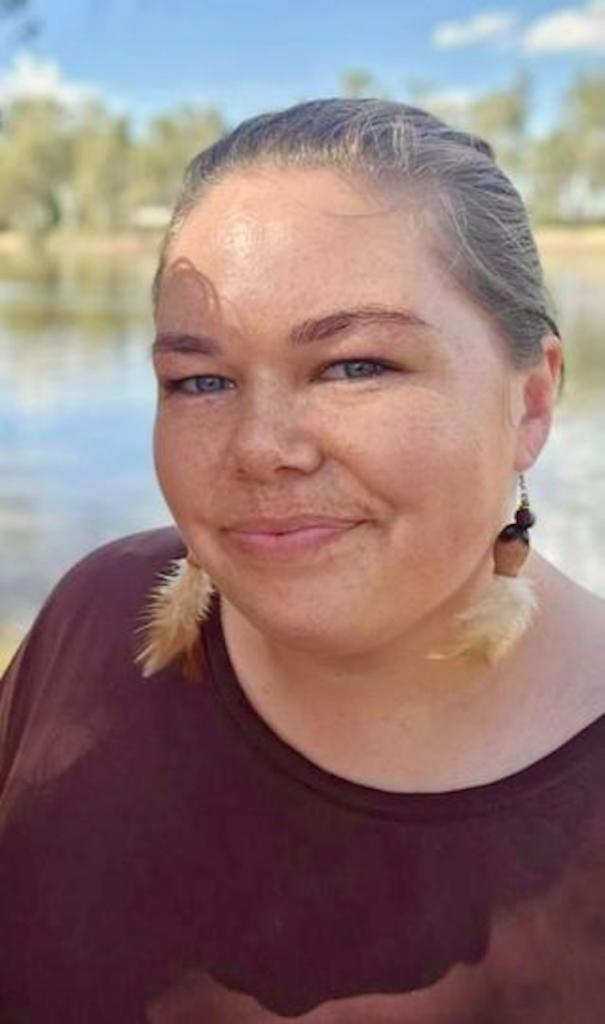
Reflecting on the last year, what emotions and feelings are you sitting with in the lead-up to January 26th?
“I’m feeling ambivalent. After the failed referendum, it feels like there hasn’t been enough time or space to sit with the grief a lot of mob were clearly feeling. People concerned with the Palestinian genocide immediately started putting their energies into supporting related actions. It demonstrates again how amazingly resilient our spirit is, but I’m also thinking about how precious a thing this spirit is. I’m sending love to those activists and also to our Elders who put a lot of steam into the referendum last year, regardless of their position.” — Neika Lehman (she/they), a 34-year-old Trawlwoolway person working on Kulin Country.
“Exhaustion. Contempt towards systems of oppression and oppressors. Need for a re-grounding of self, healing and wholeness. Need for connection. Change of focus.” — Arielle Henaway (she/they), a 24-year-old Juru person living in Meanjin.
“The aftermath of the Voice referendum, and the ongoing genocide and displacement of Palestinian people, has undoubtedly heightened my emotions in the lead-up to January 26. I think the political landscape in so-called Australia has changed and people feel more vindicated in their racism, which has been confronting but equally mobilising.” — Tyenna Hogan (she/her), a 22-year-old Palawa and Bundjalung woman living in Nipaluna/Hobart and Lutruwita.
“I am exhausted. I am sad. I have been experiencing an increase in anxiety. I never thought much of non-Aboriginal people in Australia, and I would tell myself that I was being ridiculous, but I feel like my distrust has been shoved straight back in my face. I still haven’t spoken to my Dad (non-Aboriginal) about his vote. I am currently feeling especially dejected because I have found out today, in a completely predictable move, coalition support for the Victorian Treaty Process has been renounced at a state and federal level. I am filled with rage.” — Leah (they/them/her), a 28-year-old Gunditjmara, Jadawadjali, Wemba Wemba, Weregaia, Ngargad, and Bindjali person living in Narrm.
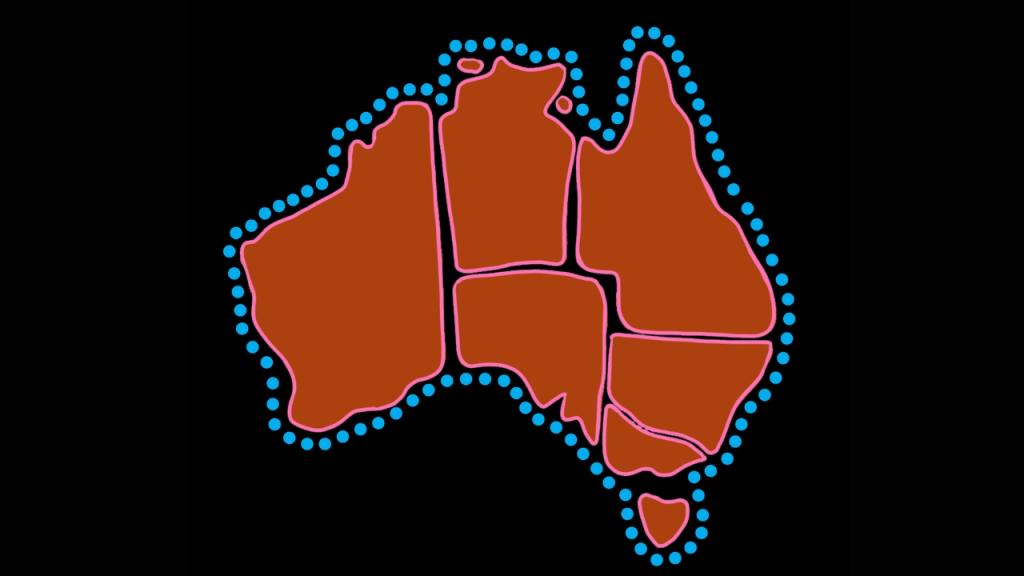
“Both disappointment and gratitude. It’s a strange mix and difficult to reconcile. I am disappointed in the lack of support for a First Nations Voice to Parliament and the process of the referendum held last year, and what feels like a great misunderstanding of what it means to advocate for and support First Nations peoples. I am grateful for the progress that has been made in First Nations advocacy and the support First Nations voices are receiving — the support millions of people showed for First Nations voices last year — and for the long line of First Nations advocates who have paved the way for the opportunities we now have as First Nations peoples. We live as we do due to the sacrifices they made and struggles they fought to overcome.” — Seth Westhead (he/him), a 29-year-old Awabakal and Wiradjuri man living on Kaurna Country.
“Quite a whirlwind. The last year has been an exemplar of this colony’s continued injustice towards not just us as Blakfullas but our Indigenous siblings in Palestine too. The whole referendum goes without saying; regardless of how we as mob chose to vote, most of us can attest to how much the process and media coverage hurt our communities. We had more mob die in custody last year. Our children are still being stolen from us. This colony continues to thieve our land and destroy it for their own profit. Grief and anger always overshadow how I feel on Invasion Day. But I also have a lot of pride in our grit, that we get up every day and continue to resist the colonial project, that every January 26th, we go out and march. It’s one of the many things that make me proud to be Blak, deep within my spirit.” — moirra (they/them), a 22-year-old Yorta Yorta and Boon Wurrung person who lives in Naarm on Wurundjeri country.
“I feel quite disappointed that not a lot has changed since my old people started fighting and advocating for justice, respect, freedom and fair treatment on our own country. We continue to fight and push for the people in power to take action, but it seems that no matter how much we fight for justice, equity, march and protest, they never truly listen to what we want nor say. Nevertheless we will continue to fight and stand up for our people and country because we simply deserve better, but to also feel safe, respected and supported, especially during the ‘Day Of Mourning’ for our mob! I think that a lot of non-Indigenous people in this country forget how privileged they are in terms of not knowing what it’s like to feel like you have no choice to fight and speak out against oppression and the mistreatment we get as First Nations people.” — Guyala Bayles (she/her), a 24-year-old Birri Gubba and Wonnarua woman living in Meanjin.
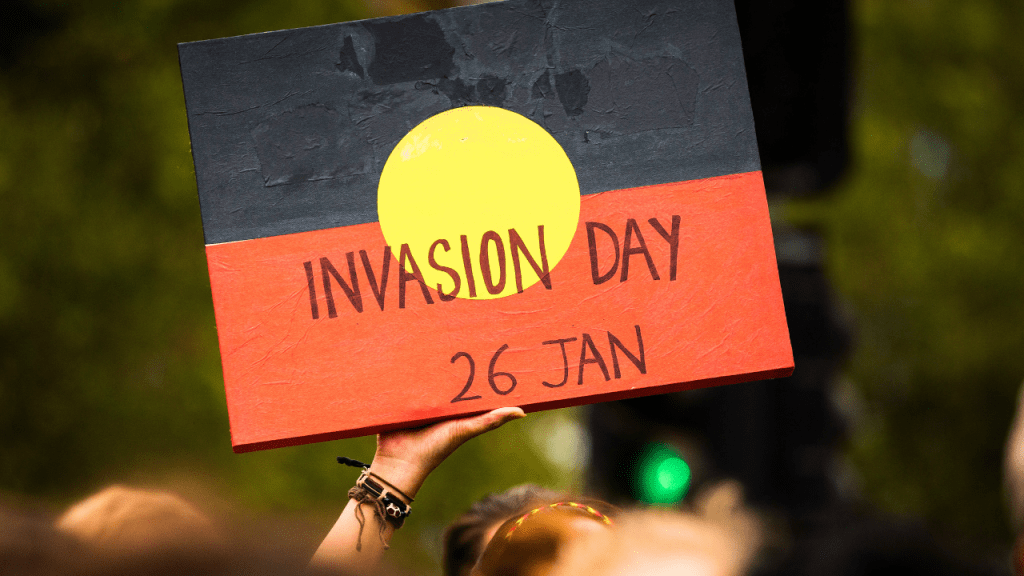
“In the lead-up to Invasion Day this year I find I’m feeling an overwhelming sense of frustration. Yes, every year we all feel like this but I think this time it’s regarding awe, confusion and shock that we are still fighting for the abolishment of the date. Only being 22, I can’t imagine how our older generations are feeling as they’ve been fighting for longer. It brings up emotions and memories of all racist experiences me and our community face still to this day and have faced. I feel so confused about how this is still happening. I do want to acknowledge those allies that we have that don’t just fight in silence through posting an Instagram story or not celebrating the day, but those who use their voice to amplify ours.” — Tananger Peet (she/her), a 22-year-old Trawlwoolway woman living in lutruwita.
“Well with the rest of Australia showing its true colours on the Referendum, which didn’t surprise mob as we always knew what kind of society we live in, it kinda leaves you with a feeling of hopelessness and makes this January 26th all the more harder because the racists have had a victory lately and they may well be emboldened by it.” — Teangi Brown, a 29-year-old Umpila, Kantju, Kuku-yalanji, Bunurong, Trawlwoolway and Plangermaireener person who currently lives in nipaluna.
“Feelings of stagnancy, especially post referendum results. I feel apprehensive about the way that wider/whiter Australia views, embraces (or doesn’t embrace) and recognises our communities. January 26 makes me feel nervous, and scared to be out in public. It makes me feel nervous to be who I am.” — Tiahni Adamson (she/her), a 28-year-old Kaurareg woman living on Tarndanya.
“I was pro-Voice and I’m finding coming into 26th more sceptical than I was previously. I’m not as keen to attend the protests and rallies. I just feel really disenfranchised in this space. I don’t feel like it’s a priority. Post referendum, seeing White Australia celebrating on the afternoon of the referendum with barbecues and at the beach was defeating.” — Toby Miller (he/him), a 31-year-old Larrakia and Wadjagan man who currently lives in Boorloo on Whadjuk Country.
“I am sitting with sadness, anger and I feel overwhelmed. January 26th is just another reminder of continuing injustice perpetrated in the name of so-called Australia; it’s just another day in the colony. I am tired, worn out, no longer surprised, but constantly disappointed by the all-consuming nature of the ongoing illegal, illegitimate and immoral occupation of the lands of first nations people.” — Zac Romagnoli-Townsend (he/him/they/them), a 31-year-old Barkindji person living in Nubeena, Turrakana in Lutruwita/Tasmania on Palawa Country
When you think about your connection to Country and Cultures, what gives you strength?
“My Elders. The gift of being born into a community of such staunch and diverse personalities. How lucky I am to be able to return to Country and, despite the increasing Airbnbs, walk along the coastline without running into many people. Feeling time as something determined by the natural world, not by the Gregorian calendar, helps ground and declutter my mind. This is probably something a lot of people who love nature can relate to, but I guess it’s the connection with culture and cultural knowledge of Country that is so special. It’s a deep sense of belonging that reminds you what’s important and what’s not.” — Neika
“Seeing the race that was run by the people before me. Hearing the stories of how they lived and how they still live. Hearing them laugh. Hearing them teach.” — Arielle
“I love to think that we ultimately still enjoy doing the same things our old people did – cooking and sharing food, spending time with community, sharing music and dancing, collecting shells etc. Despite our rapidly changing world some things remain the same.” — Tyenna
“I find strength in the Ancestors. It is through them that I have inherited my connection to Country, I am very lucky to have a direct matriarchal link to the ancestors and to Wemba Wemba Country. We are very fortunate to have maintained so many aspects of our culture, from our dreamings, to knowledge of how to traverse Country, to the bits and pieces of language that my family have maintained. I have been able to see how our Dreamings move with and are imprinted into Country. I gain strength from seeing our mark on our Country, and being able to observe how my Country has truly shaped my ancestors and my family. I see that I am truly embedded into my Country. I belong to my Country in a way that is indescribable. My body, my nose, my brow ridge, my lips, my hands and my arms, my legs, my feet, were all made for my Country.” — Leah
“My strength in this respect is drawn from the long line of caretakers and custodians who have cared for and shaped this land for all of time. I am constantly reminded that my connection to Country and Culture isn’t an event or practice, it is a way of being and interacting with the world. It is a way of relating to all that exists.” — Seth
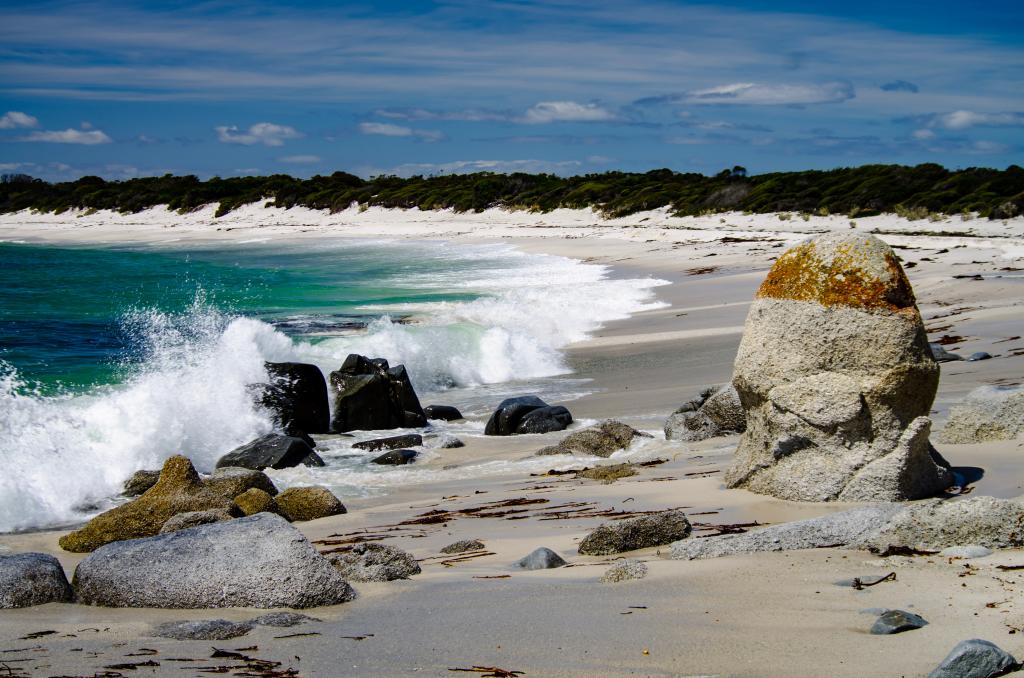
“It’s probably cheating if I say ‘all of it’. It may sound a little silly, but I draw a lot of strength from how Country is still present. It’s been poisoned and polluted, cut down and trampled, concreted and blown up and drained from the depths of its core — but it’s still there. I sometimes like to walk along St Kilda beach at night, when there are few people and the wind is cold and strong. Sit on the rocks right by the edge of the water and look across, listening to the harsh crashing of waves and how the wind almost drowns out the noise from the central district until I can’t hear or feel anything other than Country and my ancestors. There’s something in that, I think — our Country, which colonisers have tried so hard to destroy, refuses to die or be lost entirely. I draw my strength from that, and remember the fierce wind and sea waves that embrace me when I greet Country.” — moirra
“Remembering my Elders who passed fighting for self determination and creating these powerful movements of resistance against the colony. I also gain strength when I’m practising my culture, connecting with my mob, country and expressing myself through spoken word.” — Guyala
“Our Elders give me strength, knowing and seeing their strength now and in the past shows me I have that within me too. The thought of wanting the best for future generations gives me strength too, makes me keep fighting and keep pushing. I want to be a part of making a difference and making a change. My Mum gives me strength, watching her closely for my life with how she approaches all of our fights with grace but also moral fortitude and watching her connection to Country and Community. My Sister gives me strength in a way that makes me want to be the best I can, to be the role model I should be for her when it comes to our Culture, Community and Culture. Country gives me strength by watching the resilience of all beings and how bad things may happen but it keeps pushing, how it continues to grow, continues to feed, continues to give. I think naturally we receive strength from Country too, and from our Ancestors, who walk the land with us. I think they send us strength when we need it most.” — Tananger
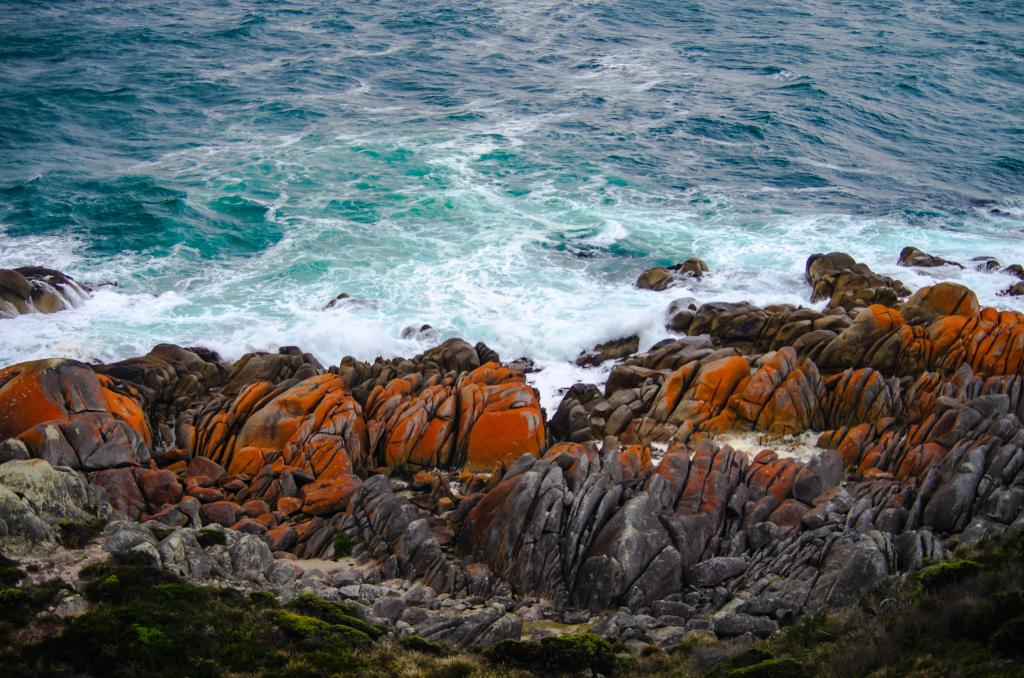
“My connection to Country is much stronger than my connection to culture, besides muttonbirding, and that’s due to the loss since invasion. But, in saying that, what cultural practices we have revived give us strength, even though they are not traditional practices they are Palawa practice, and evolve concurrently with us.” — Teangi
“Listening to Country and my Ancestors. Their strength and resilience keeps me fighting for better representation and effective change.” — Tiahni
“The women in my community. My Nan, my Aunties, my Sisters and my Mum… How hard our women work. I love our connection to the ocean and swimming and the ocean. Family and friends give me strength, having my Sister feed me or seeing my nieces and nephews really recharges me.” — Toby
“My strength comes from nurturance, it grows steadily in suitable conditions like a plant, it takes time, patience, care and persistence. My family, friends and Country have provided me with the space, love and kindness that I needed to grow into who I am.” — Zac
What are your favourite moments from attending a rally or march on Invasion Day in the past?
“Much like the Black Lives Matter rally that happened in Narrm in 2020, seeing the streets of Melbourne CBD packed with thousands of people demonstrating solidarity. I especially love seeing bubs and big families enjoying themselves. And all the creative signs.” — Neika
“It is not really a moment, but I love seeing our marches get bigger each year. It gives me hope that we are being listened to, and that increasingly people understand our cause.” — Tyenna
“There are these pockets of silence, breathing room, between the chants and cries. These are my favourite moments. There’s something powerful in knowing that the synchronised breaths are fuel for unified verbal resistance.” — Arielle
“I really enjoy being around other mob. I enjoy attending the rally and feeling the power and passion of mob, and then attending mob-only events, where we can decompress in private.” — Leah
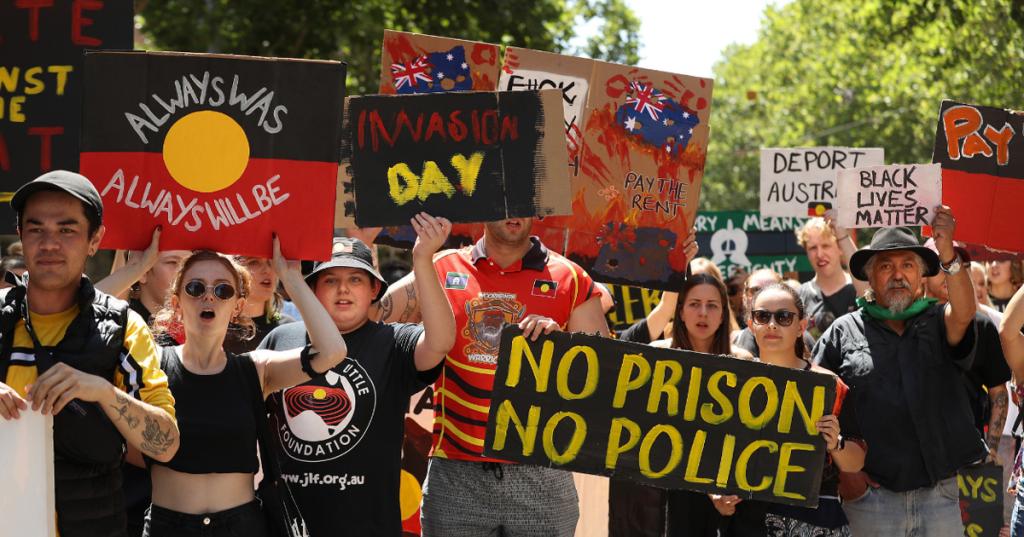
“Previously it was a sense of community, solidarity and openness which I no longer feel is reflected. I no longer attend rallies, marches or protests on Jan 26. I choose to use the day to privately reflect, listen, learn, heal and grow.” — Seth
“The moment during the Naarm Blak-Palestinian Solidarity Rally where we began chanting: ‘From the river to the sea / Always was, always will be”. It was a real deadly moment to interweave two powerful chants about Indigenous sovereignty, everyone’s voice coming together in a booming chorus. I am also grateful for the moments of care and community after the rally – getting together again and having a feed while we hold space for our collective rage and grief and the pockets of joy we create even when we’re mourning. It’s beautiful to hold and be held by your loved ones and community, and it feels more meaningful on Invasion Day.” — moirra
“When all the mob start dancing and singing in language, it gives me the strength I need to continue on my journey and fight for real change. Also seeing non-Indigenous people stand in solidarity and march with us!” — Guyala
“For quite a few years now, I have been and am on Country on Invasion Day, and haven’t attended an Invasion Day rally/march in a little while now, which I feel quite ashamed for. I feel like I’m not showing up for my community as I should be. I think I just find being on Country, for me, is a way to deal with all the emotions and also to re-energise and connect with my Ancestors. I remember going with Mum when I was young. I know I wasn’t too sure what we were fighting for but that didn’t stop me from being a strong little Blak woman yelling out.” — Tananger
“My favourite moments would be from back in 2016/17 when the Invasion Day Rallies really started to ramp up and how a good portion of the wider community came out in support — just how powerful seeing all the mob walking down through nipaluna/Hobart was.” — Teangi
“Listening to the resilience, strength and unity of our diverse Aboriginal and Torres Strait Islander communities banding together to support one another.” — Tiahni
“When attending rallies or marches, I loved seeing and connecting with different mob in past years. It’s even better when I see more and more allies turning up. That’s affirming and great to see but, sometimes I feel it’s not enough.” — Toby
“One of my favourite moments from attending an Invasion Day march was getting painted up in ochre, having a photo taken with some brothers and uncles outside of the Tasmanian Aboriginal Corporation building before the march. We then led the procession down through the city, to Parliament Lawns for the speeches, chanting and keeping the beat with clapsticks as we walked through the middle of CBD of so-called Hobart. Another favourite moment was when my Mum attended the march/rally; both times were proud moments, but this time it was more low key. My Mum is a proud, strong Aboriginal woman and an idol of mine, so walking with her felt empowering because we got to be immersed together in the groundswell of people who shared our resistance to so-called Australia.” — Zac
What legacy do you want to leave behind when reflecting on January 26th?
“I’m not interested in leaving a personal legacy, but I advocate for the knowledge of my Elders. Their knowledge and lives are the backbone of this place. I’m honestly just a nerd who wants to learn as much as I can in the short time we have.” — Neika
“The legacy of still being here. My great Grandmother was here, my Grandfather was here, my Father is here, I am here, and my children will be here.” — Arielle
“Our fights for justice are more connected than we think. There have been times when I have questioned if the routine January 26 debate has become trivial, but I have now come to realise that these events and discussions are not discrete. There are consistent parallels in the experiences of Indigenous people around the world and the narratives employed by colonising forces to dehumanise us. These conversations, and our solidarity, is more important than ever.” — Tyenna
“I think it would be really powerful to leave a new legacy of change for our people. A more positive legacy. Ultimately this date represents such a point of change that led to so much destruction, dispossession, murder, and a genocide that still reverberates throughout our communities today. It would be nice for it to signal a more positive change.” — Leah
“It’s an interesting question and I’m not sure I know how to answer it. I would like to see it recognised as a date of complex and mixed emotions for First Nations people. A day that marks the beginning of genocide, trauma, resilience and everlasting change. A day of deep reflection, within the context of colonisation, about what it means to live in this country and our place in it. This country has a brutal history AND there are many things that are worth positively recognising. How we reconcile that truth is something worth thinking about.” — Seth
“I’m not sure I want a legacy the way white people conceptualise ‘legacies’. I’d be happy enough to know that when I pass on, I’ll be remembered as someone who always showed up for community and did good by us. That’s more than enough for me.” — moirra
“A legacy of never giving up, no matter how hard it may seem, to fight for this date to be abolished (not changed, because you can’t choose a date to celebrate when the First Nations people of so-called Australia continue to suffer at the hands of our oppressors) and for everyone who lives on our scared Countries to respect the wishes of our people, so that we can move forward together! The legacy I wish to leave behind is the legacy that I’m continuing from my old people who fought against the colony and never settled for less!” — Guyala
“I think I’d really struggle to pinpoint a legacy I’d like to leave behind, my mind wants to answer in a million different ways, and I think as I grow the answers will grow. When I think of an answer my mind goes directly to the Aunties within my life, how they are so connected, calm, honest, humble but so strong and fierce, how to always trust your gut. If I get to a stage of being an Auntie that’s how I’d like to be remembered, that I will fight for what’s right and can be so strong but also show the younger generation how important it is to be gentle as well, to be calm and collected and make time for Country and our Community always, hold space for anything that needs it. To practise Culture, to connect to Country and Community, to never forget who we are and how lucky we are to have our connections and Culture and to respect it at all costs.” — Tananger
“The legacy I’d like to leave behind is [to challenge] why it matters so much to the wider community to celebrate the illegal occupation of a continent of highly diverse people? With vast knowledge and societies spanning tens of thousands of years who learned to be at one with nature and live in balance and harmony with it for millennia, why should we celebrate something that represents the destruction of that? It’s ludicrous (would we celebrate the loss of the library of Alexandria?), but I get that we as the First Peoples of this land are but a minuscule percentage within this Nation (illegal settler state) today, and so the change can only come from wider Australia as they have the voting power.
“As was so powerfully shown last year, we may ignite the firestick and put the concept of having a celebration on that day alight, but we will need every ally we can to carry this fire and burn away this Day, so another more appropriate time might be found, where we shall all celebrate and give thanks to Country instead of the Nation (illegal settler state).” — Teangi
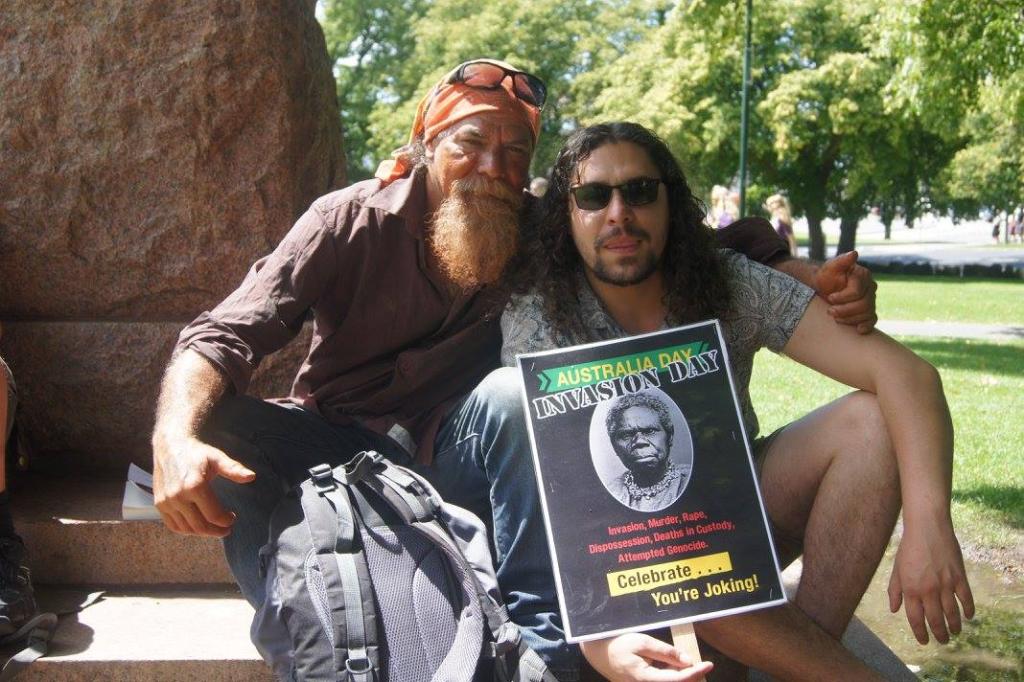
“Creating a more harmonious, safe and equitable future for our young mob and next generations. I love this continent, but we need to appropriately celebrate ‘Australia’ on a day that does not mark the colonial override of Traditional Owners, and ensure that our mob are at the forefront of these conversations. This is our land and water and we share it with diverse people.” — Tiahni
“Trying to change the hearts and minds through empathy and education. Encouraging people that doing the bare minimum is educating themselves. They need to be educated to understand the issues on a deeper, more genuine level and January 26th is not a date to celebrate.” — Toby
“The legacy I want to leave behind when reflecting on January 26th is one of truth, resistance, and solidarity.” — Zac
What do you wish more people knew or understood about your Country and community?
“That we are so much more than just survivors! There is a lot of dynamic politics, creativity and deadly science work coming from the island. When it comes to Country, while the earth is very old, on both macro and micro scales, Country is more fragile than we think. The East Coast of Lutruwita is struggling massively with marine heatwaves, overfishing and global warming. I was lucky to grow up snorkelling at the giant kelp forests at Fortescue Bay that scientists are now trying to bring back from extinction. Twenty years is all it takes to lose or regenerate our more-than human siblings.” — Neika
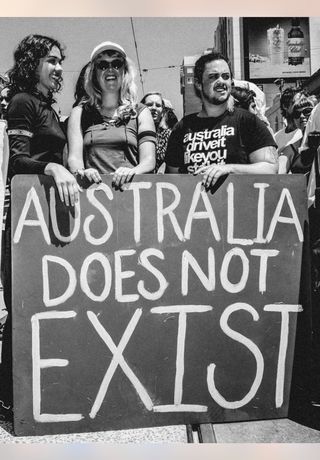
“This is our everyday. You can pick and choose how you engage, what you think and how you perceive this day. Those choices were made for us. There is unseen privilege in thinking there is cause for celebration. The choice we are forced to make is resistance.” — Arielle
“That we are diverse and doing wonderful things worth celebrating! It’s easy to only consume negative media about our people and communities, but it is so important to actively celebrate all that we have achieved (outside of NAIDOC!).” — Tyenna
“I wish people would understand that only Aboriginal people have the best resources and solutions to help our own people and Country to heal. I wish that they knew how much healing we still have to go through, and how we can’t because we have too much to do. We have constantly been fighting for our own people and our Country, unfortunately we have to wait for broader Australia to catch up a lot of the time when it comes to making more substantial changes in legislation. There is no future without Aboriginal Sovereignty.” — Leah
“How much First Nations values and ways of being could benefit us all.” — Seth
“Other than we’re the deadliest? Most of all, I wish people would more deliberately and meaningfully reflect on what it means to live on stolen Country and truly understand it. I find this less the case for Yorta Yorta Country — or any mob whose Country is out more regional or rural ways — but certainly, when talking to people in Naarm/Melbourne, there’s this sense of fundamental disconnect that they are on Country unless it is a reserve of some sort. It’s as if the moment they live in a grass-manicured suburb, they can’t connect that they’re still on stolen, sacred land (because all land is sacred). But my Country, which is paved over and has hotels, restaurants, and roads all through, is as beautiful and deserving of respect and care as my Country which has miljee on the sandhills and thornbill dancing about.” — moirra
“I wish more people took the time to learn about the connection we have to each other and our Country! When the rest of so-called Australians educate themselves about the true history of this Country and learn about the impacts of colonisation, I think they would have more empathy and a deeper understanding of who we are and why we tirelessly fight to protect our country, our kids and our people.” — Guyala
“All our voices, fights and movements all come from a place of love, passion, and hurt. I see lots of different people instinctively getting defensive when they see or hear us fighting for something. You will only ever hear us protesting and fighting for things that will truly benefit our health, wellbeing and most importantly our future generations. We want to live harmoniously with everyone but we need that power to decide what we need, only we know what we truly need and it’s about time that gets the respect and action it deserves. I’d also love for non-Aboriginal people to feel for just one day what we feel on Country with our people, our old fullas. I know that isn’t possible but it would make it so much easier to get our points across if people felt our deep connections, even if they just tried, just get on Country just breathe for a minute, watch what happens around you, disconnect from society, hear our stories, our songs, see our dances, connect with us.” —Tananger
“This is a difficult one, but let’s just simplify it down to the most widely held myth about us, the fact that Tasmanian Aboriginal People the Palawa (in our words) are alive and healing today, we are not extinct! We practice our culture and still care for Country now and will into the future.” — Teangi
“The extreme diversity of Torres Strait Islanders to other communities. The cultural richness, history spanning over 65000 years and ways that we intricately nurture Country and one another.” — Tiahni
“The deeper connections that people have to place, space and family! That it is more than just surface level connections and that communities aren’t nuclear and that knowledge and culture is so deeply ingrained and it’s not all the same. Aboriginal and Torres Strait Islander people aren’t a monolith and that we all have different ways of life and living. We have different law and lore.” — Toby
“I wish that people knew and understood that so-called Australia does not exist in a legitimate way. I wish more people got it; the original peoples are the rightful sovereign of these lands, air and sea.” — Zac
Madeline Wells is a Trawlwoolway, Plangermaireener, Mutti Mutti, Wadi Wadi, Wemba Wemba and Wotjobaluk queer woman, living on Palawa Country in Nipauna, Lutruwita.


